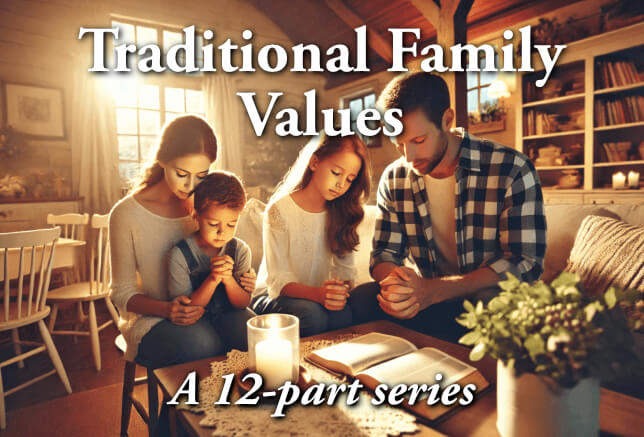Welcome to our 12-part series on traditional family values, where we explore the essential role that family plays in society according to biblical teachings and supported by secular research. Over the next several weeks, we will explore the foundational principles of marriage and family as ordained by God, the impact of neglecting these values, and the importance of returning to a family structure that promotes stability, love, discipline, and spiritual growth.
Family Values Boost Healthier Communities
Each installment will provide insights into how traditional family values contribute to healthier individuals and stronger communities, highlighting the critical need for a renaissance of the American family. Join us on this journey as we reaffirm the significance of family in fostering a society that reflects God’s love and purpose.
As a first step, we encourage you to share our 12-part series on traditional family values with your friends and family and on social media. Spreading these insights can help foster understanding and support for the biblical foundation of marriage and family.
The Importance of Traditional Family and Adoptions
The traditional family, as designed by God, is foundational to a healthy and loving environment. This environment reflects God’s love for His children and is the bedrock of healthy societies. Over the past fifty years, however, the traditional family has been neglected and even shunned, leading to a culture rife with immorality, pain, and spiritual longing. This correlation between broken homes and societal decay is evident in the alarming statistics on crime and family instability in America.
Societal Decline Due to Neglect of Family Values
This shift in family dynamics has contributed to various social issues, including increased crime rates. Statistics show that 70 percent of teenage criminals come from broken homes, and the same applies to adolescent murderers. (The Heritage Foundation) (LiveAbout).
Research
Research by the Heritage Foundation indicates that children from broken homes are significantly more likely to experience a variety of adverse outcomes, including poverty, criminal activity, and poor academic performance. Children living with both biological parents are less likely to encounter these issues compared to those from single-parent or step-family households. These findings align with biblical teachings on the importance of family stability and the roles of both parents. You can access the study and its detailed findings here (SpringerLink). This study provides robust evidence of the positive effects of being raised by both biological parents on various child outcomes.
Biblical Foundation of Family
The Bible emphasizes the importance of family and marriage from the very beginning. In Genesis 2:18, God says, “It is not good that the man should be alone; I will make him and help meet for him.” This led to the creation of Eve, establishing the first marriage. Genesis 2:24 further underscores this by stating, “Therefore shall a man leave his father and his mother, and shall cleave unto his wife: and they shall be one flesh.” This foundational principle highlights the sanctity and importance of marriage and family in God’s design.
Secular Perspectives on Family Values
Secular research also supports the importance of traditional family structures. Studies have shown that children raised in stable, two-parent households perform better academically, emotionally, and socially. For instance, a study published in the Journal of Marriage and Family found that children living with both biological parents consistently show better outcomes than those from single-parent or step-family households. These findings align with biblical teachings on the importance of family stability and the roles of both parents.
The Impact of Broken Homes
Broken homes contribute significantly to various social problems. According to a report by the Institute for Family Studies, children from broken homes are more likely to experience poverty, engage in criminal activities, and struggle academically. The report states that “children living with both biological parents are less likely to experience a wide range of adverse outcomes” compared to those living in non-traditional family structures. This reinforces the biblical perspective that stable, God-ordained family units are essential for nurturing well-rounded individuals.
Addressing the Crisis
To address the current crisis, society must return to respecting and upholding traditional family values. This includes marrying rather than cohabiting, resisting no-fault divorce, and opposing the legalization of non-traditional partnerships and adoptions. As Dr. D. James Kennedy of Coral Ridge Ministries stated, “If America is going to survive and thrive, it will require a renaissance of the American family.” Such a renaissance involves honoring the Bible’s teachings on family and marriage.
Biblical Instructions for Family Life
The Bible provides clear instructions on how families should operate. Ephesians 6:4 advises, “And, ye fathers, provoke not your children to wrath: but bring them up in the nurture and admonition of the Lord.” Proverbs 22:6 emphasizes the importance of proper upbringing, stating, “Train up a child in the way he should go: and when he is old, he will not depart from it.” These verses highlight parents’ critical role in their children’s spiritual and moral development.
The Role of the Church and Community
The church and community also play vital roles in supporting traditional family values. By promoting biblical teachings on marriage and family, the church can help strengthen family units and provide a supportive environment for parents and children alike. Community programs focusing on family counseling, parenting classes, and youth mentorship can also contribute to reversing the trend of family breakdowns.
Conclusion
The traditional family, as ordained by God, is essential for creating a loving and stable society. The neglect of these values has led to significant social issues, including increased crime rates and broken homes. Returning to biblical principles and supporting traditional family structures can address these problems and work towards a healthier, more stable society. As Psalm 127:1 states, “Except the LORD build the house, they labor in vain that build it: except the LORD keep the city, the watchman waketh but in vain.” Honoring God’s design for the family can build a stronger foundation for future generations.
Call to Action
As we embark on this series exploring the importance of traditional family values, let us commit to strengthening our families and supporting others in our community. Together, we can create an environment that reflects God’s love and fosters the development of healthy, well-rounded individuals. Let us pray for a revival of traditional family values in our society and take active steps to uphold these principles daily.
Let us pray for a revival of traditional family values in our society and take active steps to uphold these principles.
The author partially generated this text with GPT-4.0, OpenAI’s large-scale language-generation model.





